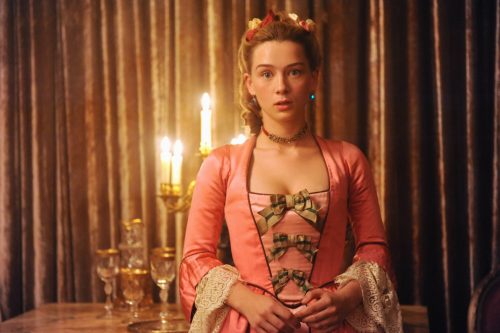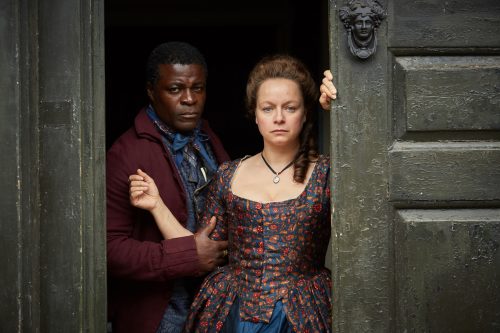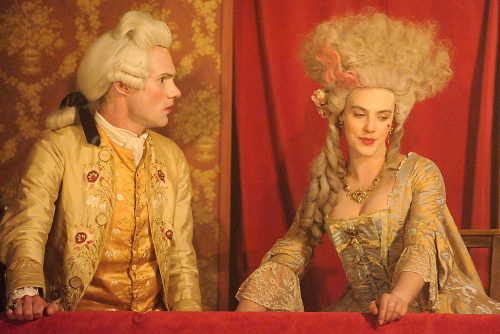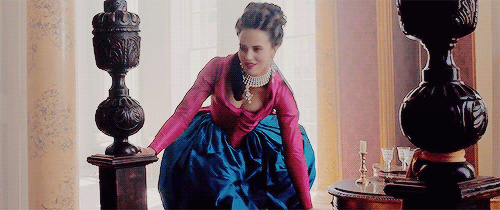We’re always on the hunt for awesome TV shows we should be watching. This guest Stuff You Should Be Watching is brought to us by Heather Morris! Thanks, Heather!
Heather Morris is a cyborg librarian living in North Carolina. Her work has appeared in Shimmer, Strange Horizons, and Daily Science Fiction, among other places. She’s on Twitter @NotThatHeatherM and she blogs sporadically at thebastardtitle.wordpress.com.
…
While much ink has been justifiably been spilled about Hulu’s new adaptation of The Handmaid’s Tale, there’s another recent Hulu original series featuring a heavily-female ensemble cast that deserves some attention. Harlots, a show created, written, and directed entirely by women, is a show you should be watching.
Based on Harris’s List of Covent Garden Ladies: Sex in the City in Georgian Britain by Hallie Rubenhold, itself an exploration of what was essentially a guide book to the sex workers of 18th century Britain, Harlots is one of the most fun and fascinating costume dramas I’ve seen in a long time. And I watch a lot of costume dramas. Like, a lot a lot.
The show follows Margaret Wells (Samantha Morton), a working-class madam with aspirations of moving up in the world. She runs a house with a few average working girls, but she has grander plans for her own two daughters. Oldest daughter Charlotte (Jessica Brown-Findlay) already has a rich protector in the foppish Sir George Howard, and at the beginning of the series Margaret auctions off younger daughter Lucy’s virginity to the highest bidder. Twice. (Really.)

The stories of Margaret and her family and friends intersect and contrast with those of the high-class madam Mrs. Quigley, (a delightfully villainous Lesley Manville) who treats her own girls horribly, and once counted Margaret Wells among her victims.
Being that this is a show about sex work, there’s plenty of flesh on display. But here is where I think you can really tell that this show is guided by women creatives. The sex is never played for titillation. Indeed, it is often fairly comical as the men eagerly thrust and work away at it while the women are bored, or hungry, or tired, or anxious. (They do have moments of pleasure, of course, but this is their work, and it’s shown as the labor it is.)
There are also inevitably sexual threats and assault, and your tolerance for these scenes may vary, but for the most part those events have occurred off screen, as the writers seem to trust that allusion is enough. It’s a distinction I appreciate. This is not a show like Game of Thrones where rape is relished with gory voyeuristic glee; rape and coercion are a very real part of these characters’ world, but it’s not used as a salacious plot point.
One of the first things that caught my eye about Harlots is that there are POC on screen. From the very beginning. In more than one type of role. There’s Margaret’s partner William (Danny Sapani), the only male character shown to have any innate decency. There’s Violet, a harlot who’s falling for the daughter of the local anti-vice crusader. There’s Harriet, a former slave from Virginia whose white common-law husband unexpectedly dies, leaving her children in the ownership of her cruel stepson (their half-brother). Historical dramas (and history itself, of course) are so often whitewashed that it is a consistent joy to see these characters exist and be fully rounded, and there’s always a hope for more as the series progresses.

It’s also refreshing to see a range of different bodies on screen. There are plus-size characters here, there are characters with ample assets and characters who are less well-endowed. Characters who are drop-dead gorgeous and characters who are plainer. Women of different ages—not everyone is an 18-year-old ingénue. Someone could very easily have conceived a version this show with a bunch of identical blonde models, so I always appreciate when a cast feels more reflective of real life.
And then we have the costumes. Oh my god, the costumes. I am not exactly an authority on Georgian fashion so I make no claims to its authenticity, but the costumes on display are delicious. Charlotte in particular is always the center of focus with bright, bold colors and intricate detail to her looks. Wild wigs and beauty marks abound. Mrs. Quigley, to my eternal delight, has pink eyebrows. Men tend to wear more makeup than the women, a detail which so many historical dramas seem to ignore. I would probably watch this show for its costumes alone. If I cosplayed, I would want to make them. They are exquisite.

There are certainly criticisms worth considering. Harlots is not the most subtle of shows. Occasionally the dialogue goes over-the-top to hammer home a point, and there’s one grim early subplot where the ravaged body of a woman dead of venereal disease is literally used as a back-and-forth pawn in Wells’ and Quigley’s game of one-upmanship. The thumping EDM soundtrack is ridiculously silly (although it certainly has an effect). But ultimately this is a show about women, about their relationships and their resiliency and their power, and I think that alone makes it worth watching. It veers between moments of camp and excellence, and I am fascinated to see where it will go from here.
As far as why the show appealed to me, and why I thought it would appeal to many romance readers: my gateway to reading historical romance came through watching costume drama first, and I think there’s a lot of overlap of interest between those even when said costume dramas aren’t necessarily romantic. That said, there’s not one overarching romantic plot to Harlots (at least yet.) There are a lot of different relationships & the attendant drama– ex. Charlotte is being paid to be in one relationship but she has pantsfeelings for a male harlot, Margaret is jealous of the attention her partner pays to Harriet though it’s not clear that there’s really anything for her to worry about, there’s Violet who’s making doe eyes (and later making out with) the daughter of the anti-vice crusader, and another harlot named Emily Lacy who manipulates Quigley’s son for various reasons, but he clearly feels romantically towards her and by the end of the season she seems to be starting to reciprocate. However it’s an ongoing show (at least, the ending is open and I assume there will be more seasons), so none of those romantic plotlines are particularly resolved in the episodes that are available.

Though mostly I’m basing this on the time period, it kind of reminds me of Hoyt’s Maiden Lane books, with fewer masked vigilante dukes and tiny dogs.
I see it as a show about an ongoing conflict between two factions of women, one of which is ‘antiheroes’ and the other of which is definitely ‘villainous,’ and sometimes one has the upper hand, sometimes the other, but as of yet there are no clear resolutions. It does get dark, but I don’t think it ever gets hopeless.
What about you? Are you watching Harlots? What do you think?
https://www.youtube.com/watch?v=JmUP1idcOhU


it kind of reminds me of Hoyt’s Maiden Lane books
Ooooooh yes!
with fewer masked vigilante dukes and tiny dogs.
Awwwwww bummer.
The always awesome Frock Flicks reviewed the costumes and hairstyles! Here’s a link to their archive: http://www.frockflicks.com/tag/harlots-series/
I have heard good things about this from others. I just need Hulu.
I love Harlots! One of the things that struck me was, yes, that it’s made by women, about women, and the female gaze feels quite different. I’ve been to talks by one of the historical advisors, Lucy Inglis, and remember being struck by her comment that there weren’t a lot of occupations for women in Georgian London that didn’t involve sex.
What’s really fascinating is how these are women in charge of their own fates, or at least trying to be. Fast forward a hundred years and how many unmarried women would be owning property in prime spots and running businesses with a dozen or more employees? (Man those victorians really did a number on us). They’re providing a much-desired service and profiting from it, and everyone has such a refreshingly open attitude to it!
I do appreciate how it puts the darker side of sex work in there, too, keeping it from being too glamorous. The disease, the pregnancy risks, the violence, and of course the endless supply of innocent country girls lured into ‘honest’ work, gang-raped and murdered or thrown out onto the streets.
(To my modern eyes it’s kind of funny, too, how Greek Street, at the heart of Soho, used to be SO salacious and is now slightly past it, usually full of tourists and giggly middle aged women on a day trip to see Mamma Mia. Not quite the danger spot it once was…)
Wow this show looks great! I think I really might check it out now!
I started watching Harlots finally. I’d been debating about it back and forth, wondering if it would be as emotionally draining as A Handmaid’s Tale. I finally gave in to my curiosity and watched, now I am hooked. I find the open doors during sex to be funny – since sex is supposed to be kept behind closed doors and all. I mean, do you really want someone finding out that you’re at the local bawdy house when you’re supposed to be doing something else?
The one thing that squicked me out was the girl washing out the condom for reuse.. I was like.. oh no, that’s so bad… she just used water to rinse it out… please tell me there’s alcohol or something stronger in that bowl.
I agree with some of the drama being over the top… I felt terrible for Mary and how she was used. Definitely going to keep watching.
@Mischa – yes, condoms were washed out and reused through the 18th and 19th centuries. I remember one of Courtney Milan’s books (The Countess Conspiracy, set in the 1860s) mentioning this….
I love this show! And it just got a renewal. S2 is on its way.
You had me at Jessica Brown Findlay and it only got better from there. I am SO watching this show. Thanks for the review!
[…] And I wrote about my newest favorite binge-watch, Harlots, here. […]
I thought “Harlots” would be a must-watch, but I only got about halfway through the first episode before thinking “I do not need to see another squalid story of women being abused and oppressed, no matter how gorgeous the costumes are.” Maybe it gets fun at some point, but the part I saw was zero fun. No can do zero fun this summer.